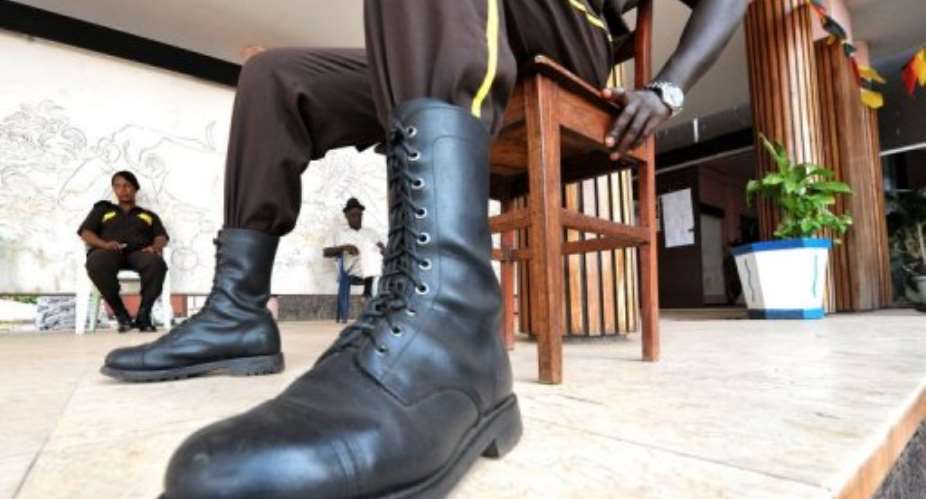BISSAU (AFP) - Unable to feed the inmates, guards at a small prison in Guinea-Bissau had to let the detainees go free, yet another sign of the worsening crisis in the west African nation reeling from an April 12 coup.
Offices are shut and workers have not been paid while the coup leaders, hit with both regional and international sanctions, have rejected calls to restore the elected government they toppled just two weeks before an election.
A guard at one of the capital's jails shook his head helplessly: "We had to free all the common-law prisoners because we couldn't provide them the one daily meal they have a right to."
As ex-prisoners roam the streets of this former Portuguese colony which became a trafficking hub for Latin American cocaine, the criminal justice system has completely broken down.
In the suburb of Copilum, the central prison was built for 50 inmates, but has three times that number crammed inside its dilapidated, cracked walls.
"The justice minister has fled the country, the courts are closed, lawyers and judges are waiting at home for work to start up again. We are doing what we can," said policeman Bacar Sane.
"All the offices are closed, there is no work, no salary. Life has stopped for us civil servants," says public teacher Filinto Reis.
Armed men are posted around main public buildings in downtown Bissau, even though there is no one inside after the country's main union called a strike to protest the coup.
The Guinea-Bissau army claimed it staged the coup because of an alleged secret deal by the government with Angola, also a former Portuguese colony, to destroy the armed forces which have been in conflict with the state for decades.
They arrested prime minister and election favourite Carlos Gomes as well as interim president Raimundo Pereira, who was appointed after the death of president Malam Bacai Sanha in January.
Both have since been released and sought refuge in Abidjan, Ivory Coast's economic capital.
Since 1998, the country of 1.6 million people has been through one civil war, four military coups as well as the murder of one president and four military chiefs-of-staff. No president has ever completed a full term in office.
The instability has allowed traffickers to exploit the struggling state as a key transit point for cocaine being moved from Latin America into Europe.
The 15-state Economic Community of West African States (ECOWAS) has offered a peace plan and is preparing to send in a security force to guarantee the Angolan troops leave, but the deadlock persists.
The ousted ruling party refused an ECOWAS suggestion that new parliamentary officials be named and the speaker become president of a transition government, which followed the junta's refusal to let Pereira return to his post.
A new mission is expected to be sent by Friday to try to negotiate the impasse.
At the Bandim market on one of the capital's main roads, traders waited desperately for business.
"Civil servants haven't been paid. As a result purchasing power has plunged. We don't have any clients," said Senegalese trader Abdou Ndiaye.
When night falls, the capital is plunged into darkness, only illuminated sporadically by car headlights.
"We are rationing the electricity supply because of the seven generators we have, only three are working," said an employee of the power company.
In the scorching heat, most water pumps are not working, and at daybreak, women head out in search of water.
At the Bissau port, trucks stand waiting to drop off cashew nuts, the country's main export product.
At the end of March, the government fixed the price of cashew nuts at 250 CFA per kilo (0.38 euro, $0.49) but this has dropped as low as 150 CFA.
"We are no longer allowed to draw more than one million CFA (1,524 euro, $1,900) from the bank. It is an unfair decision but we understand because of the prevailing situation," said cashew trader Souleymane Diallo.





 Former Kotoko Player George Asare elected SRC President at PUG Law Faculty
Former Kotoko Player George Asare elected SRC President at PUG Law Faculty
 2024 elections: Consider ‘dumsor’ when casting your votes; NPP deserves less — P...
2024 elections: Consider ‘dumsor’ when casting your votes; NPP deserves less — P...
 You have no grounds to call Mahama incompetent; you’ve failed — Prof. Marfo blas...
You have no grounds to call Mahama incompetent; you’ve failed — Prof. Marfo blas...
 2024 elections: NPP creates better policies for people like us; we’ll vote for B...
2024 elections: NPP creates better policies for people like us; we’ll vote for B...
 Don’t exchange your life for wealth; a sparkle of fire can be your end — Gender ...
Don’t exchange your life for wealth; a sparkle of fire can be your end — Gender ...
 Ghana’s newly installed Poland train reportedly involved in accident while on a ...
Ghana’s newly installed Poland train reportedly involved in accident while on a ...
 Chieftaincy disputes: Government imposes 4pm to 7am curfew on Sampa township
Chieftaincy disputes: Government imposes 4pm to 7am curfew on Sampa township
 Franklin Cudjoe fumes at unaccountable wasteful executive living large at the ex...
Franklin Cudjoe fumes at unaccountable wasteful executive living large at the ex...
 I'll 'stoop too low' for votes; I'm never moved by your propaganda — Oquaye Jnr ...
I'll 'stoop too low' for votes; I'm never moved by your propaganda — Oquaye Jnr ...
 Kumasi Thermal Plant commissioning: I pray God opens the eyes of leaders who don...
Kumasi Thermal Plant commissioning: I pray God opens the eyes of leaders who don...
